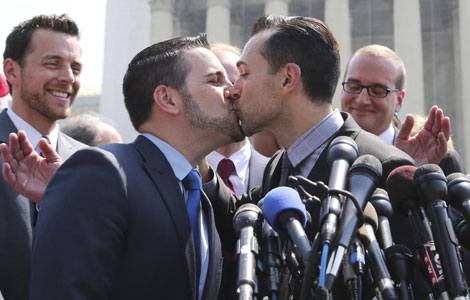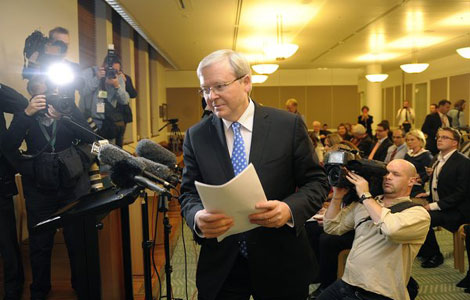Phase out extraordinary stimulus plans: Zoellick
Updated: 2013-06-13 10:08
(The Straits Times)
|
||||||||
The "extraordinary" monetary policies undertaken by central banks may be "planting seeds of a future crisis" if they are not carefully phased out, said former World Bank president Robert Zoellick yesterday.
Issuing the dire warning, Zoellick said that low interest rates arising from these policies have led to a disconnect between asset prices and economic fundamentals.
Zoellick's comments, on the final day of the two-day Nomura Investment Forum in Singapore, came amid increasing calls for central bankers in developed economies to bite the bullet and take steps towards "tapering" or cutting down on massive stimulus measures.
Central banks in the United States and Japan, among others, have been rolling out huge monetary stimuli ranging from holding down interest rates to multi-billion dollar bond purchases in an attempt to kick-start lacklustre economies.
Last week, Alan Greenspan, the former chairman of the US Federal Reserve, said the central bank should taper its US$85 billion a month bond-buying programme, even if the economy is not ready for it.
Although Zoellick did not specify a timeline during the forum, held at The Ritz-Carlton, Millenia Singapore, he warned that central banks cannot continue expanding their balance sheets indefinitely.
The basic premise of expansionary monetary policy is to bring spending forward from the future to smooth economic cycles, he said. "I'm wondering whether and when the benefits of continued extraordinary monetary stimulus will be outweighed by the risks... Given the long lag times of monetary policies, the transition to normalcy will require special care."
On Monday, Nomura economists said the Fed is expected to start "tapering" its quantitative easing programme by year-end at the latest, and possibly as early as September, as US economic indicators keep improving.
Zoellick, whose term at the World Bank ended last year, said the effectiveness of these policies will be assessed on whether or not economies are able to "get back on their feet".
He was responding to a question from the audience about whether such policies are considered unfair, for continuously providing "easy money" to support weak economies and inefficient businesses.
Zoellick, who has been a senior fellow at his alma mater, the Harvard Kennedy School, since leaving the World Bank, also spoke about the prospects for the US economy.
He said the United States' medium- and long-term outlook is very positive.

 Philippine, US start Naval exercise in S China Sea
Philippine, US start Naval exercise in S China Sea
 Supreme Court gay rights ruling celebrated across US
Supreme Court gay rights ruling celebrated across US
 Rudd returns as Australian PM after Gillard
Rudd returns as Australian PM after Gillard
 Brazil protests intensify before Confed Cup semifinal
Brazil protests intensify before Confed Cup semifinal
 Long lost weekend
Long lost weekend
 Park ready to charm China
Park ready to charm China
 Prices climb as police crack down
Prices climb as police crack down
 China 'most promising' in FDI
China 'most promising' in FDI
Most Viewed
Editor's Picks

|

|

|

|

|

|
Today's Top News
Proposed law puts curbs on family visas
Markets will stay volatile, continue to struggle: Expert
Promising outlook on US, China investment
US adoptees visit Chinese roots
Ecuador refutes Washington Post accusation
IBM to make Chinese job cuts
PBOC ends credit crunch, to go further
Snowden still at Moscow's airport, asylum pending
US Weekly

|

|







